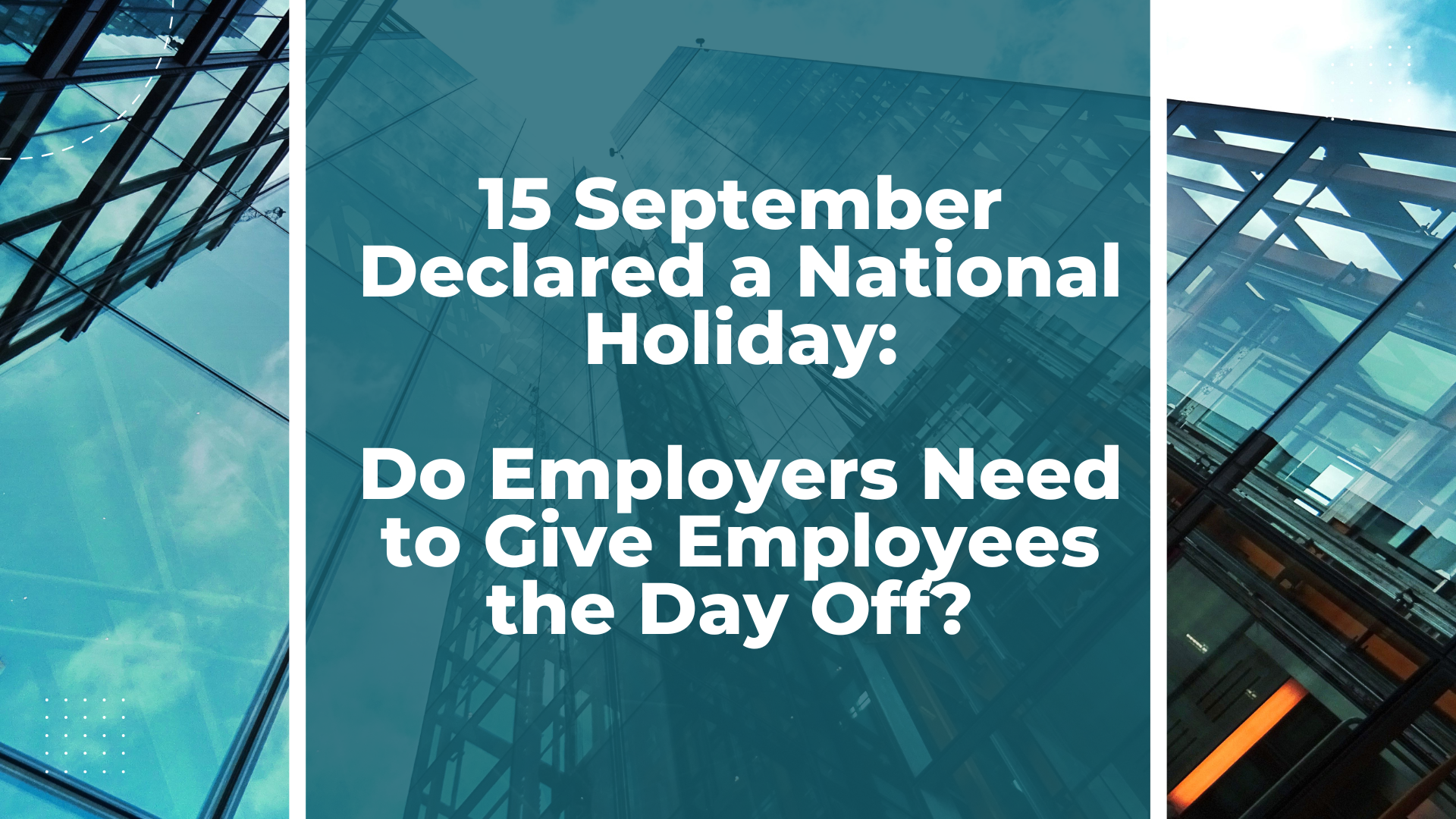15 September Declared a National Holiday: Do Employers Need to Give Employees the Day Off?

In short: Yes – the declaration of 15 September 2025 as a national holiday means employees are entitled to a paid day off. If you require your employees to work, you must either provide a substitute holiday or comply with the statutory rules on holiday pay.
This article explains the legal basis for this requirement and the practical steps employers should take.
The Legal Framework
Although announced every once in a while, there are a lot of misconceptions in Malaysia when it comes to ad hoc holidays. Employers in Malaysia must consider two key statutes:
1. The Employment Act 1955 (EA 1955)
Section 60D of the EA 1955 provides that every employee is entitled to at least 11 paid public holidays in a calendar year, five of which are compulsory (National Day, the Birthday of the Yang di-Pertuan Agong, the Birthday of the State Ruler or Yang di-Pertua Negeri/Federal Territory Day, Workers’ Day, and Malaysia Day). The remaining days are chosen by the employer and notified to the employees at the beginning of each year.
If an employee is required to work on a paid holiday, the Act provides that he or she must be compensated with:
- Two days’ wages at the ordinary rate of pay in addition to the holiday pay; or
- A substituted holiday on another day.
2. The Holidays Act 1951 (HA 1951)
Section 8 of the HA 1951 gives the Minister the power to declare additional public holidays. The section states:
“The Minister may, by notification in the Gazette or in such other manner as he thinks fit, appoint, in respect of Peninsular Malaysia, or the Federal Territory or, after consultation with the State Authority, in respect of a State, a day to be observed as a public holiday or a bank holiday in addition to, or in substitution for, any of the days mentioned in the Schedules...”
This means that when 15th September was declared as a national holiday, such declaration become binding on all employers. They must treat this declaration as such, regardless of the list of 11 holidays they may have already designated.
Applicability to All Employees
Since the amendments to the Employment Act 1955 taking effect on 1 January 2023 through the Employment (Amendment) Act 2022, the Employment Act now applies to all employees regardless of salary level (previously, the threshold was RM2,000). This means that the entitlement to paid public holidays under section 60D extends equally to executives, managers, and other senior staff, not only to those earning below a former wage threshold.
While certain provisions of the Act – such as those on overtime rates, hours of work, and termination/layoff benefits – may still be limited by a prescribed wage ceiling, public holiday entitlements apply universally across the workforce.
With this in mind, employers should consider the following practical implications when managing the newly declared holiday.
Practical Implications for Employers
As an employer, you should:
- Communicate promptly to employees whether your company will close for the holiday or remain operational.
- Ensure payroll is adjusted correctly if employees are required to work.
- Consider operational needs (e.g., manufacturing, healthcare, essential services) and plan shift rosters accordingly.
- In any event, grant your employees two days’ wages at the ordinary rate of pay in addition to the holiday pay or a substituted holiday on another day if they have to work.
- Document arrangements clearly – for example, by issuing a short written notice to affected employees (particularly those rostered to work), so there is no dispute later about compensation or substitute leave.
- Review internal HR policies and handbooks – make sure they reflect the correct legal position post-2023 Employment Act amendments, especially if older versions still mention the now-defunct RM2,000 threshold.
- Coordinate with outsourced payroll providers – to ensure additional holiday pay is correctly calculated and recorded. Errors here often lead to claims.
- Consider employee relations – even if not legally required, aligning treatment across staff (for example, between EA and non-EA staff in global operations) avoids friction and demonstrates fair practice.
⮕ Need help navigating employment compliance in Malaysia?
Companies often make mistakes in practice when communicating arrangements. This can lead to unnecessary misunderstandings. In the worst case, your disgruntled employees may file a complaint with the Department of Labour, which may then follow up with an investigation, or regard your decision on the public holiday as constructive dismissal and sue before the Industrial Court.
Make sure you do not make such costly mistakes. In case you require assistance such as reviewing your draft communications or advising on an intended course of action, contact us for swift advice.
Case Example
When the Government declared an additional public holiday in May 2018 after the General Elections, many employers were uncertain about their obligations. Some companies provided the day off as a paid holiday, while others designated a substitute holiday later in the year.
The Ministry of Human Resources clarified at the time that the holiday was binding under section 8 of the Holidays Act 1951, underscoring the need for employers to follow the statutory requirements even where operational difficulties arise.
Importantly, employers are obliged to know the law – and act accordingly – with or without clarification from the Ministry of Human Resources. It is your obligation to be informed and do the right thing – or face the consequences.
Conclusion
The law is clear: employees are entitled to a paid day off on 15 September 2025. If work is unavoidable, employers must provide the statutory compensation. Taking early steps to communicate with staff and adjust payroll will minimise legal risk and maintain good employee relations.
Need help navigating employment compliance in Malaysia?
Our team regularly advises on workforce management, statutory entitlements, and HR policies. If you would like tailored advice for your business, please feel free to contact us.

.png)